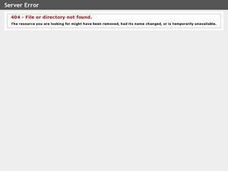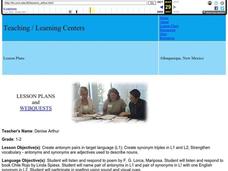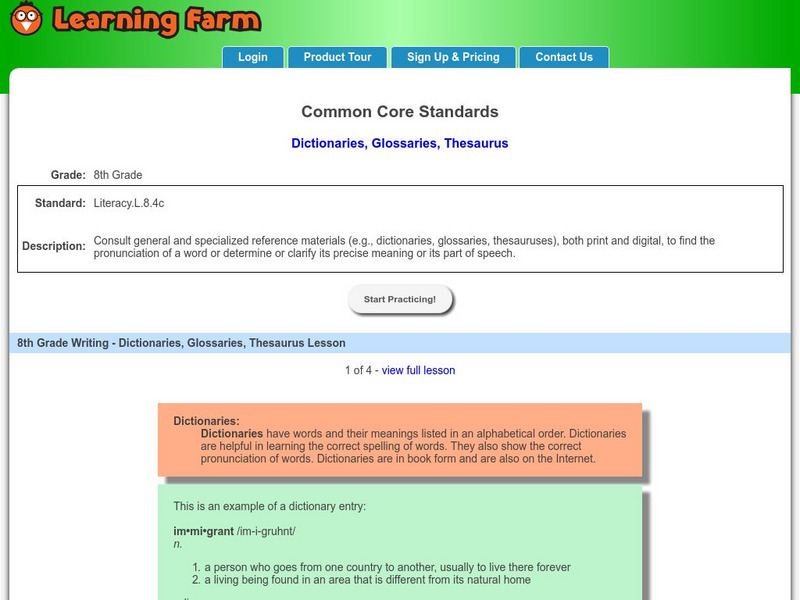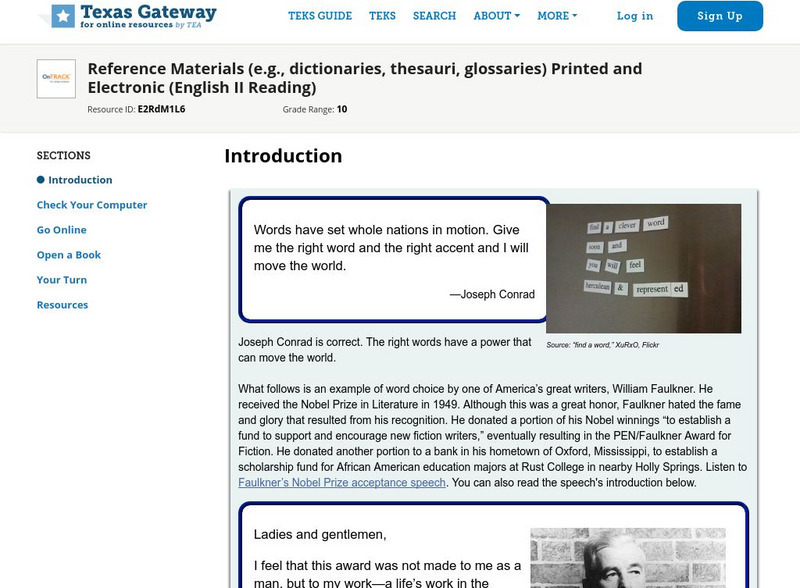Curated OER
Conventions and Proofreading
Pupils explore and apply their proofreading skills in order to prepare their project essays for peer editing and final drafting. They refine their final project essays by identifying and correcting spelling and grammatical errors.
Curated OER
Hopi Culture: Parts of the Corn
Students identify the parts of the corn stalk in English and Hopi. They discuss the significance of corn to the Hopi culture, and examine a diagram of the corn stalk. They discuss the purposes of the parts of the corn stalk, then label...
Curated OER
Rikki-Tikki Research
Fourth graders perform a search on mongooses on Internet Explorer and answer research questions.
Curated OER
Synonyms and Antonyms
Students explore and respond to poetry. They define and identify synonyms and anotnyns. They create antonym pairs in English. They create synonym pairs in English and Spanish.
Curated OER
Stylistic Aspects of Composition
Young scholars explore verbs. They list and demonstrate verbs. Students discuss words that connote different meanings. They write paragraphs based on their word selection. Young scholars share their paragraphs with the class.
Curated OER
Reading and Spelling Activity
In this Language Arts worksheet, students read a short text and answer 8 questions. For example, students choose the correct spelling of the word excited.
Curated OER
Mother Goose Poetry
Young scholars practice technology skills such as open, save, print,
type, font size, font type. They also do graphics, importing,text wrapping.Critical thinking,graphic design, presenting are other skills practiced.
Curated OER
Looking for Newton
Students discuss the rhyming pattern of various types of poetry. With a focus on limericks, they follow the specific rhyme scheme and create a limerick about Newton. They share their poem with the class and write another one related to...
Better Lesson
Better Lesson: Learning to Recognize and Use Strong Verbs
In this lesson, students will listen to stories and determine the meaning of the word by using sentence-level context clues. They will think about the verbs that are used and think about how that verb appeals to their senses, giving them...
Other
Visual Thesaurus: Shades of Meaning
In this lesson, small groups of students will compete in a "shades of meaning" contest to see which group can use the Visual Thesaurus to help them match words with similar definitions but different connotations in the shortest amount of...
Learning Farm
Learning Farm: Common Core Standards: Dictionaries, Glossaries, Thesaurus
Learn about different reference materials such as dictionaries, glossaries, and thesauri to help you learn meanings of words, pronunciation, or parts of speech. View a short lesson then practice using Game Mode or Test Mode.
Alabama Learning Exchange
Alex: Using Vivid Adjectives
This upper elementary lesson plan focuses on the use of vivid adjectives to enhance student writing. Students will explore vivid adjectives in a variety of activities including thesaurus use and story development software.
ClassFlow
Class Flow: Dictionary
[Free Registration/Login Required] Students will recognize the functions of dictionaries and the types of information available in dictionaries used in schools. They will learn the differences between dictionaries and thesauruses....
Information Fluency
Imsa 21st Century Information Fluency (21 Cif) Portal
The 21st Century Information Fluency (21CIF) Portal was developed by the Illinois Mathematics and Science Academy (IMSA) to improve Internet search skills for the advancement of information literacy. The goal of this project is to help...
Information Fluency
Imsa 21st Century Information Fluency (21 Cif) Portal
The 21st Century Information Fluency (21CIF) Portal was developed by the Illinois Mathematics and Science Academy (IMSA) to improve Internet search skills for the advancement of information literacy. The goal of this project is to help...
Lumen Learning
Lumen: Rhetorical Reading: Read Strategically: Retain New Words
This lesson plan focuses on strategies to retain new words such as reading voraciously, use a good dictionary and thesaurus, use new words, and learn a new word every day. It also provides an annotated biography of resource material.
Alabama Learning Exchange
Alex: Building Word Castles
In this lesson, students will explore unfamiliar words found in various picture books by Patricia Polacco. Students will discover the meanings of unfamiliar words by using a dictionary and find synonyms and antonyms with a thesaurus. The...
Texas Education Agency
Texas Gateway: Reference Materials: Printed and Electronic (English Ii Reading)
This lesson focuses on using resources such as dictionaries, thesauruses (or thesauri), and glossaries to find and use words that will improve not only your reading skills but also your writing skills. L.11-12.4c References



















